Pennsylvania Consumer Data Privacy Act (PCDPA)
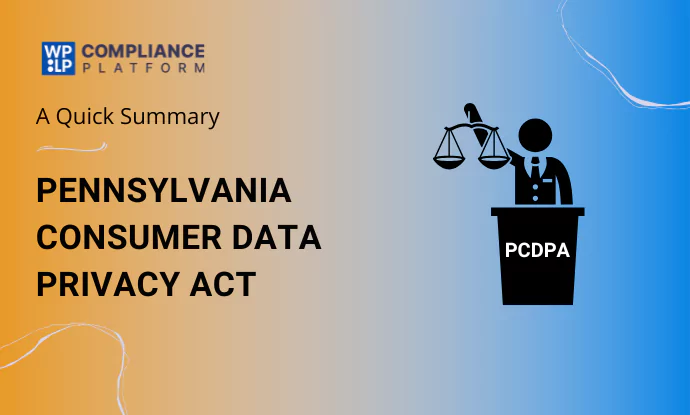
Summary
Businesses must adopt privacy policies, manage consumer data requests, and ensure secure data processing. Non-compliance can lead to civil penalties. This guide covers everything you need to know about PCDPA, including who it applies to, key requirements, and enforcement measures.
Do you know what the Pennsylvania Consumer Data Privacy Act is?
Lawmakers across the United States are implementing stricter data privacy laws.
As the movement expands, Pennsylvania has enacted House Bill 1947, also known as the Pennsylvania Consumer Data Privacy Act (PCDPA).
The law codifies how businesses must handle the collection, storage, and usage of consumer data.
The PCDPA addresses the growing issues of privacy infringement and the misuse of data.
The Act also provides essential provisions that secure consumer rights against businesses while making sure that there are robust data security protocols in place.
For businesses in Pennsylvania, comprehending PCDPA compliance is a matter of great significance.
This blog post aims to explain PCDPA and the consumer rights it provides. We will also discuss business obligations and their importance for any businesses operating in Pennsylvania.
Who within Pennsylvania is subject to data privacy law compliance? Let’s break that down together.
What is the Pennsylvania Consumer Data Privacy Act? (PCDPA)
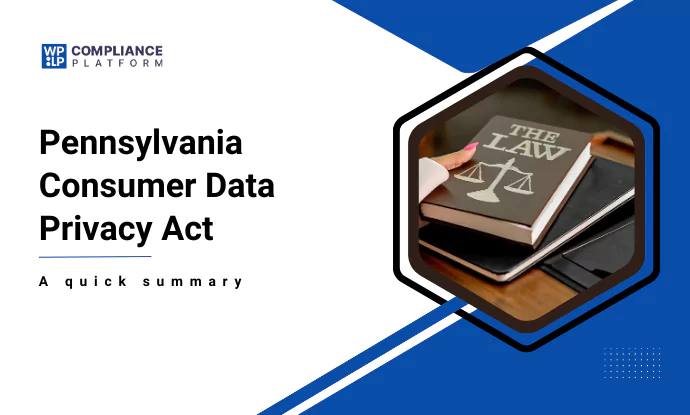
The Pennsylvania Consumer Data Privacy Act, often referred to as PCDPA, is a sophisticated piece of legislation that was, at some point, under consideration in the Pennsylvania House of Representatives.
Pennsylvania intended House Bill 1947 to be its first extensive data privacy law, but it never took effect.
The legislation imposed stringent requirements on businesses that wished to deal with personal data of constituents, detailing how various companies within the state could obtain, handle, and utilize information from residents of Pennsylvania.
It also extended greater control and authority to the residents for managing their personal data.
While the law was not passed, the PCDPA demonstrated a critical gap in privacy policy legislation in the state and the need for the state’s lawmakers to pay closer attention to resident’s privacy.
Who Must Comply With the Pennsylvania Data Privacy Act?
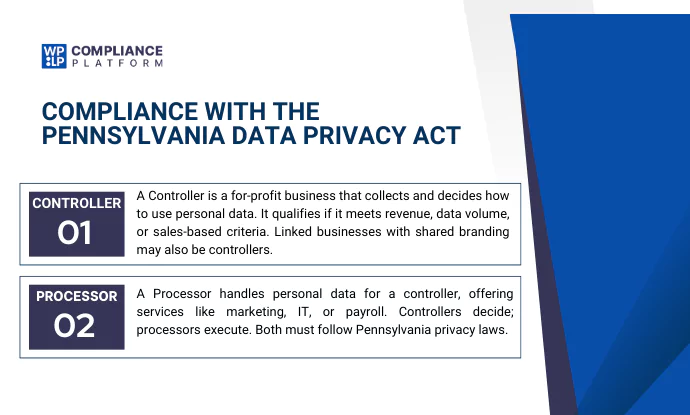
Any businesses in the state of Pennsylvania that deal with consumer information are subject to the PCDPA Act. The terms are similar to The EU’s GDPR with a few distinctions.
Now to analyze who is in charge under the law, let’s first break down a controller or a processor with regards to PCDPA compliance.
Who is a Controller Under the PCDPA?
A controller is a business that meets all of these conditions:
- Operates for profit.
- Collects personal data and decides how to use it.
- Meets at least one of the following thresholds:
1. Has over $10 million in annual revenue. (Source: dataguidance.com)
2. Sells or shares the personal data of 50,000 or more users, households, or devices annually. (Source: Wilmerhale.com)
3. Receives 50% or more revenue from the selling of private information. (Source: Securiti)
A business might not meet the threshold but can still be regarded as a controller if it is a subsidiary or affiliate of a qualifying business.
If both businesses share a common brand and a trademark or name, then they equally fall within the bounds of the PCDPA provisions.
Who Is a Processor Under the PCDPA?
A Processor refers to any person or entity that performs the functions of a controller.
Processors are services that handle data including:
- Marketing services
- General IT services
- Companies handling payroll
In essence, personal data is handled by a controller, and with respect to the controller’s actions, personal data is processed by the processor.
Both the processor and controller are PCDPA compliant and operate under the privacy laws of Pennsylvania.
What are the Consumer Rights Under PCDPA Law?
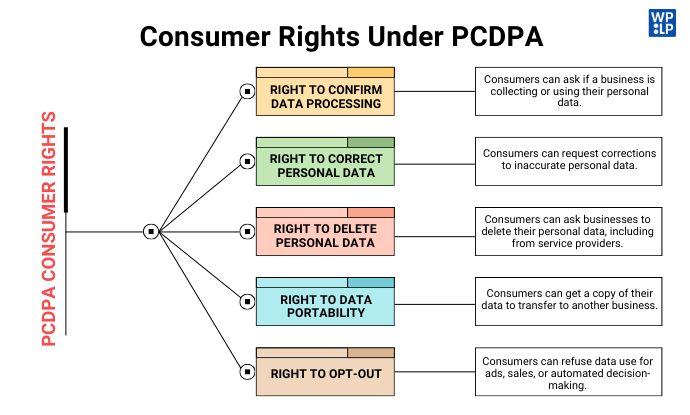
The new Pennsylvania law known as the PCDPA or Pennsylvania Consumer Data Privacy Act lets people make more choices about their data.
With this law, consumers have the right to access, correct, delete, obtain, and restrict profiling and sales of their information.
1. Check If Data Is Being Used
Consumers have the right to interrogate businesses whether they are using or gathering their personal data. This right requires organizations to handle personal data transparently.
2. Right to Change Personal Data
If an entity holds anything personally identifiable that is wrong, a consumer has the ability to change it. This facilitates the existence of accurate data and personal information.
3. Right to Erase Personal Data
Consumers have the right to request businesses to delete their personal information from their databases. Companies now also have to tell their service providers to erase the data within 45 days of an authentic request.
4. Changing Address and Business Data Portability
Consumers should receive their data in a desired usable format, thereby facilitating the movement of information from one business entity to another.
5. No Consent Given
Consumers have the power to revoke authorization for use of their data in areas such as:
- Advertising through a target market
- Automated data gathering for the purpose of selling personal information
- Brutal data gathering for decision-making on employment, housing, healthcare, and other necessary financial services
These PCDPA Rights enable the residents of Pennsylvania to exercise their self-discipline in protecting their sensitive information and in establishing how corporations manage it.
How Business Can Comply With PCDPA Regulations?
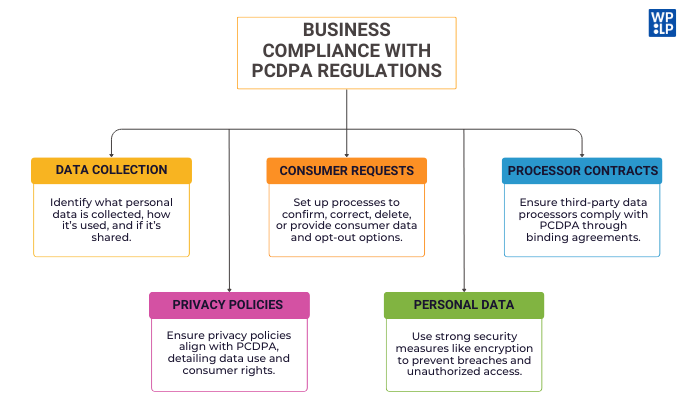
All companies that conduct business in Pennsylvania need to follow certain protocols in order to comply with the Pennsylvania Consumer Data Privacy Act (PCDPA).
The following are the most important actions businesses should take regarding the Act:
1. Review Current Data Collection Processes
It is important for businesses to determine what personal information is collected, how it is used, and if it is shared with third parties. Constructing a data inventory can help track sensitive information.
2. Adjust Existing Privacy Policies
Companies will need to change their privacy policies to meet the Pennsylvania law’s requirements and state clearly what information is gathered, how it will be utilized, and the steps consumers can take under the PCDPA Law.
3. Establish Procedures to Address Consumer Rights Requests
Organizations should ensure that they have a system in place to deal with requests from consumers such as:
- Enabling users to confirm if their data is being processed or not.
- Allowing users to correct erroneous information.
- Allowing users to delete their personal information.
- Enabling users to provide their data for easy utilization.
- Allowing users to opt-out of being targeted for data sales, advertising, or automatic profiling.
4. Safeguarding Personal Information
It is vital for companies to have adequate protections in place to avert unwanted breaches, access, and misuse of consumer data. To comply with PCDPA standards, data need to be encrypted, and access must be restricted to sensitive data.
5. Set Up Agreements with Processors
When needing to share consumer information with third-party processors, a business must enter into contracts that guarantee these third parties will observe the terms of the PCDPA. This includes obligations to protect data and process it in a safe manner.
6. Perform Periodic Compliance Audit
Businesses ought to do a self-evaluation if their practice is adherent to the relevant Pennsylvania privacy law from time to time.
Compliance audits are helpful to discovering potential problems and resolving them before they become a larger issue.
Implementing the aforementioned procedures ensures compliance with the PCDPA as well as protection of consumer information from misuse and business legal repercussions.
How can WPLP Compliance Platform help comply with PCDPA regulations?
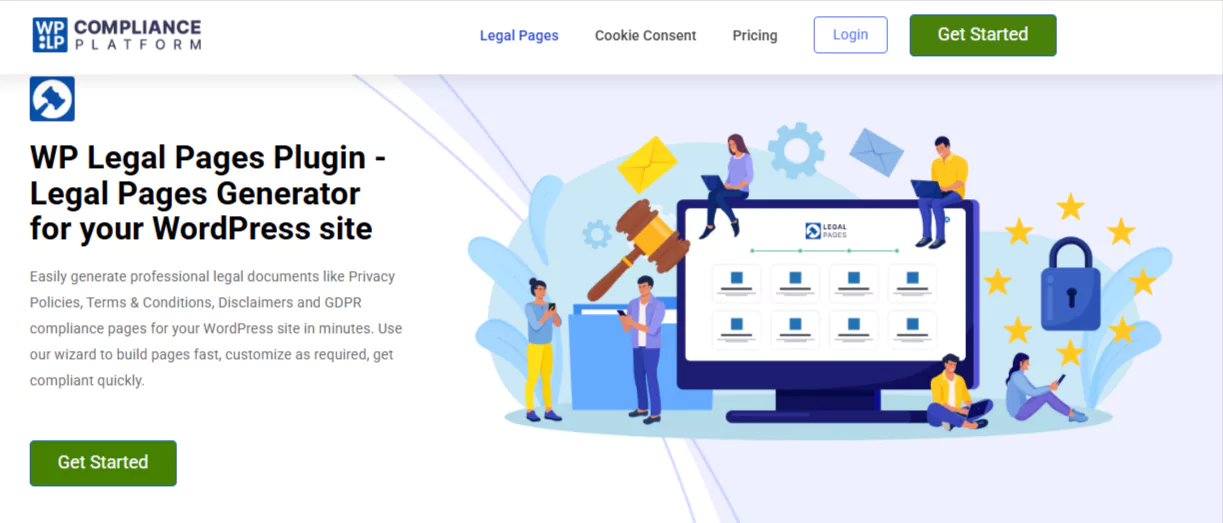
The WPLP Compliance Platform alleviates the burden for companies trying to comply with the PCDPA laws. Together with WP Legal Pages, the platform formulates essential legal documents which include privacy policies, cookies policies, and terms of service. Each page comes with a simple setup and customization to fit the specifications of your website. This helps to notify your clients on the precise collection and usage of their data by your business.
The platform also aids in obtaining the correct user consents. It supports cookies banners as well as opt-in forms. This enables easy compliance with PCDA laws on openness and accountability regarding the handling of data. With these measures in place, your website can maintain compliance while enhancing user trust.
PCDPA Penalties and Fines for Non-Compliance

A business has 60 days to remedy any reported infractions under the Pennsylvania Consumer Data Privacy Act (PCDPA). Moving past this deadline means facing repercussions.
Businesses and Servicing Providers who are in breach may be sued, which has its own complications.
Depending on culpability, fines will differ:
- Involuntary infractions: Up to $2,500 in fines per breach.
- Deliberate infractions: Fines increase significantly to $7,500.
Unlike other privacy legislation, consumers cannot initiate legal action against businesses under the PCDPA.
FAQ
This is a proposed law designed to govern the privacy of consumer data in Pennsylvania. Businesses would be bound to specific conditions regarding collation, processing, and sharing of data with varying degrees of permissions granted to consumers.
For-profit enterprises with a presence in Pennsylvania must comply with the PCDPA legislation if they:
Make over $10 million in revenue annually,
Process personal data for at least 50 thousand people, households, or devices,
Or earn half of their total income through the sale of consumer data.
Recipients must comply with a notice of violation within 60 days.
Unintentional violations may be subject to penalties, such as fines of not more than 2,500 dollars for each incident.
Deliberate breaches could incur penalties of not more than 7,500 dollars for each violation.
Consumers have no right of action against businesses under the PCDPA.
To comply, a business is required to do the following:
1. Draft a privacy policy that complies with the PCDPA.
2. Complete the consumer data requests in 45 days.
3. Assess data protection for high-risk processing.
4. Create data processing agreements with the providers.
5. Provide automated systems for universal opt-out from data collection.
Conclusion
The Pennsylvania Consumer Data Privacy Act (PCDPA) is one step closer to becoming law and is an important shift in the direction of consumer data protection.
With increasing concerns about data privacy, Pennsylvania seeks to create policies that define how businesses should manage sensitive information.
Though the PCDPA is still a proposal, it stands as a representation of greater state-focused privacy legislation dominating the country.
Business compliance with the PCDPA goes beyond avoiding fines, which is merely one of the benefits of postulating the legislation—it allows reconciling trust relations between businesses, and PCDPA outlines specific compliance processes that businesses must follow.
Businesses need to implement robust privacy policies, service consumer requests on time and perform risk evaluations, as well as execute data processing agreements with other service providers.
Complying with, and more importantly, anticipating the formula elevates the organization’s reputation and relationship with its consumers, both of which greatly benefit the business.
As the website legal requirement landscape shifts, organizations that actively adopt strong data governance strategies will be better positioned to respond to new regulations.
In addition to the commitment to reinforcing data security, getting ahead of the mundane compliance requirements makes business sense, creating a competitive advantage.
The PCDPA strengthens the need for greater transparency and security while promoting the protection of consumer rights, which results in enabling organizations to adapt to changing regulations while increasing customer loyalty in the long run.
Businesses can ensure secure, efficient, and compliant data processing by leveraging AI, Big Data technologies, cloud computing, and compliance tools like WP Cookie Consent and WP Legal Pages.
If you like this article, you might also like:
- What is the California Consumer Privacy Act
- The California Privacy Rights Act (CPRA)
- Oregon Consumer Privacy Act: An Overview of OCPA
Are you looking to process your cookie data automatically? Grab the WP Legal Pages Compliance Platform for easy operations!
